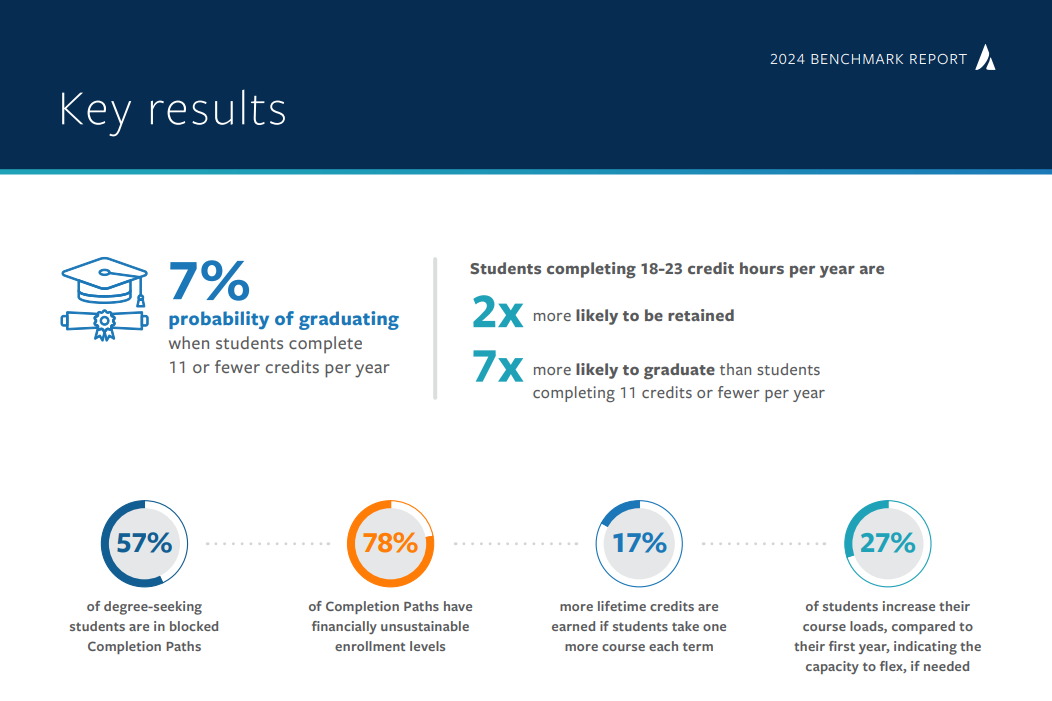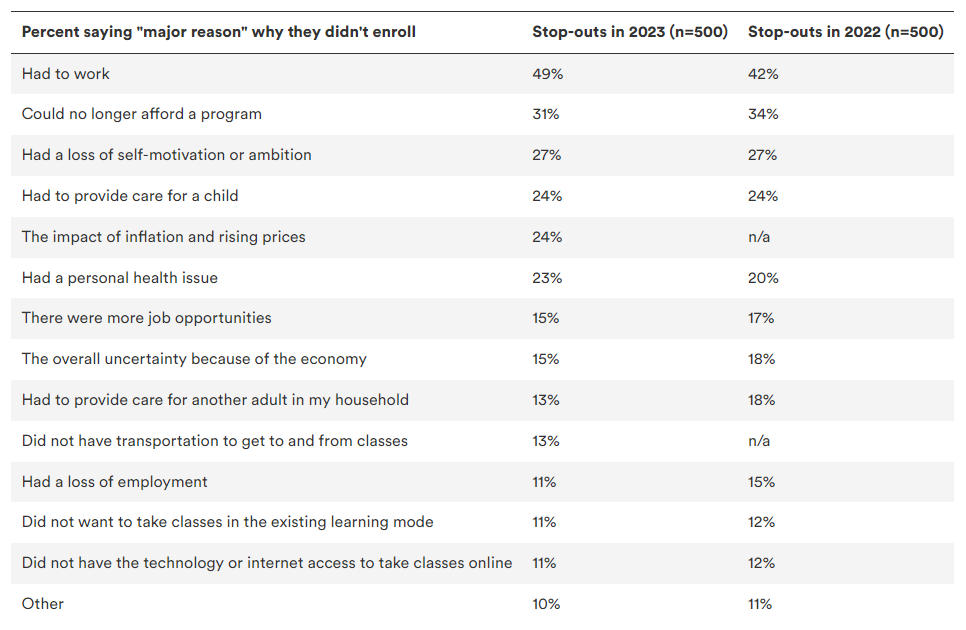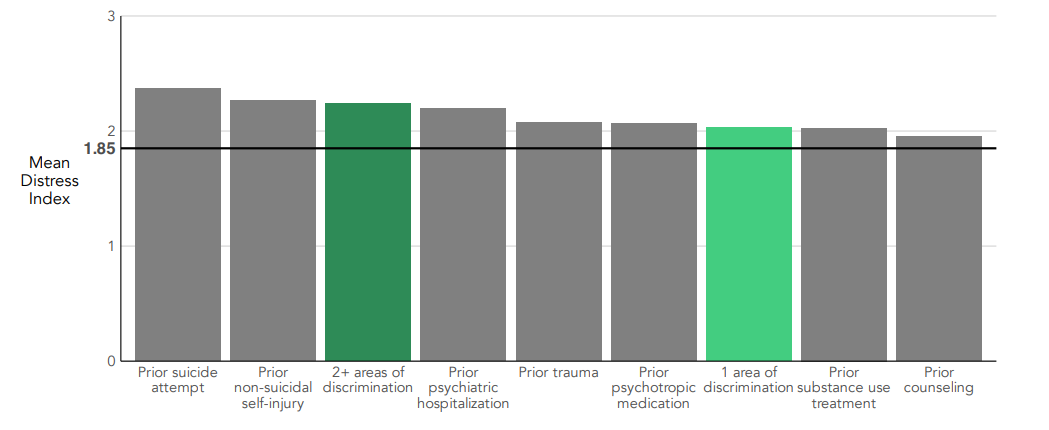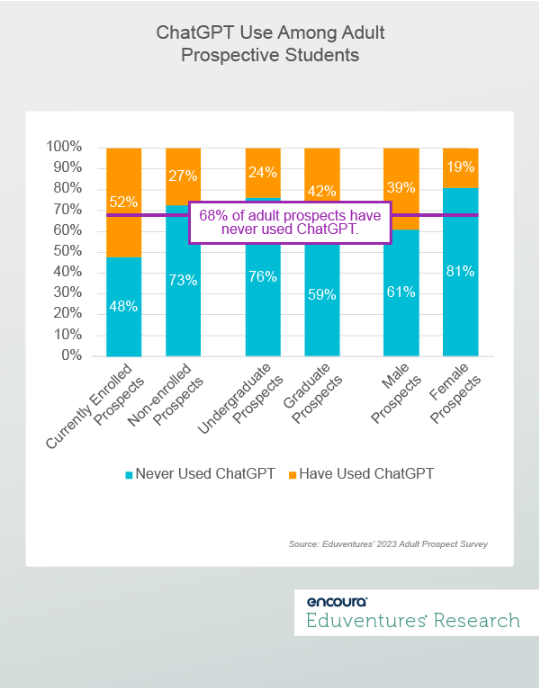February, 2024 Eye on Research
Commentary
Heads or Tails?
Contrary to research highlighted in previous blogs which reported a growing number of employers are eliminating a 4-year degree requirement for many jobs, the authors of
this report anticipate an increase in the percentage of jobs in the United States that will require a 4-year degree by 2031. This prediction indicates a possible shift in the job market, valuing formal education more in the coming decade. However, as with any forecast, the actual outcome remains uncertain; only time will reveal the accuracy of this prediction or previous predictions.
In a similar thread, the recent Talent Disrupted report by the Strada Education Foundation adds to the uncertainty regarding the need for a 4-year degree as a prerequisite for some employment. This report revealed that 52% of graduates with a 4-year degree are underemployed 1 year after graduation. This figure remains at 45% 10 years after graduation. However, the rate of underemployment varies across different college majors.
Additionally, Forbes recently published The Growing Discontent with American Education, which highlights previous research indicating that 26% of U.S. adults with higher-education experience believe their coursework is not relevant to their work and daily life. Finally, data from WGU labs indicate that only 40% of learners who borrowed funds to complete their education believe their education is financially worthwhile.
Based on these data, the future role of 4-year degrees in the labor market and among learners appears uncertain.
My question of the day is–how do we in higher education advise learners in this environment?
AACRAO Research Update
Undergraduate Credit for Prior Learning AACRAO Survey
The updated 2019 AACRAO Credit for Prior Learning (CPL) survey has been distributed to primary contacts in the U.S. and Canada at undergraduate-serving institutions. This initiative is a collaboration between AACRAO and CAEL and aims to engage our collective members. The survey's findings will contribute to a benchmark report and inform the development of an upcoming AACRAO book focused on learning mobility. The survey poses questions to institutions about their offer and/or acceptance of CPL. The survey is accessible until the end of day March 7, 2024, EST.
Redefining the AACRAO Glossary–A Call to Participate
AACRAO aims to establish a recurring, national U.S. Higher Education Nomenclature Committee to engage in the foundational exercise of defining and agreeing on terms. The first part of initiative is to update the 1956 AACRAO Glossary of Terms. The first two committees will be comprised of 5-6 individuals from AACRAO members, individuals in institutional leadership positions, and peer organizations with experience in postsecondary processes. Each group will work together for five months on different sections of the glossary starting in April. The task will involve updating existing terms, removing outdated ones and adding new terms as needed. Meetings will be conducted virtually on a monthly basis starting after the annual meeting at a TBD date. Volunteers will be expected to participate in the monthly meetings and contribute to the shared document asynchronously over the five-month timeframe.
Group 1: April 2024 - August 2024
Group 2: September 2024 - January 2025
If you are interested in volunteering for this project, please complete this interest form by March 13th. A stipend of $1100 will be provided to each participant. We will complete the member selection process by March 27th.
2024 Research Calendar
AACRAO’S research calendar for 2024 is fully scheduled with grants and projects of mutual interest to our membership and other nongovernmental higher-education organizations. Consequently, we may deviate from conducting 60-Second surveys this year. At present, we plan to concentrate on four comprehensive surveys, each scheduled for a different quarter of the year. The subjects of these surveys are as follows.
- Credit for Prior Learning–Scheduled for the first quarter (Q1), this survey explores current practices and policies regarding the recognition of prior learning for credit.
- Response to Federal Regulations Change on Transcript Holds–Planned for the second quarter (Q2), this survey aims to gauge anticipated changes in institutional practices in response to the recent changes in federal regulations regarding transcript holds. A segment of this survey may focus on the impact of state transcript bans on institutions where bans exist. This segment would provide valuable insights to institutions without state bans who are preparing to adjust institutional practices in light of new federal regulations.
- Dual Enrollment Policy and Practice Benchmarking–Set for the third quarter (Q3), this survey serves as an update to the 2016 survey and will benchmark current policies and practices in dual enrollment.
- Registrar Career Profile Survey–Scheduled for the fourth quarter (Q4), this survey aims to gather and analyze data on the career profiles of registrars and is part of our ongoing career profile series.
These surveys are designed to provide comprehensive insights into each topic so we may offer valuable information to our members. We anticipate surveys will contribute significantly to our collective understanding of these important areas in higher education.
Working On Refining How We Deploy Surveys
Our membership-and-communication team, with your assistance, is actively engaged in developing AACRAO member profiles. AACRAO members have begun to receive short questionnaires asking you to update your profile. Data gathered through these requests also enhances the quality of the membership data and helps us better understand its needs and individual professional roles.
In addition, our eventual goal is to be able to identify individuals directly responsible for specific subject matter areas. This shift will allow us to identify and connect with members who have direct expertise and responsibility in fields relevant to our surveys and upcoming research projects, rather than regularly asking the primary contact to complete or forward a survey.
Research Participation Opportunities
International Transcript Receipt and Evaluation Practices Survey
The working group on Digital Delivery of Credential Evaluations (DDCE) is conducting a survey to benchmark how institutions receive international-transcript and international-credential-evaluation reports. Traditionally, these reports have been mailed, but with technological advancements, digital delivery is becoming more common. Data collected will be used to form the basis of recommendations for future practice. The target audience for the survey is personnel familiar with these processes at U.S. and Canadian institutions of higher education. The survey has been extended through March 21, 2024. Use this link if you wish to participate.
Please contact Julia Funaki if you have any questions about the DDCE survey.
Current Higher-Education Research and Related Topics
Report From AdAstra Benchmarks the Effectiveness of Course Scheduling
In a comprehensive report that requires download, Ad Astra conducted an analysis of the relationship between students' academic-degree progress, retention and completion. AdAstra used its predictive analytics methodology in this study. Significant improvements in completion and retention rates across all partner institutions were directly linked to the indicators identified in the investigation. Through benchmark and longitudinal analysis, findings underscored the importance of integrated course scheduling and academic preparation as effective strategies. These strategies were highlighted as pivotal in enhancing learner success. Key findings from the study are illustrated in Figure 1.
Figure 1: Key Results from the Report

Source: 2024 Benchmark Report | Ad Astra. (n.d.).
Undergraduate Enrollment Shows Increases
Undergraduate enrollment data from the National Student Clearinghouse Research Center shows Fall 2023 saw a 1.2% increase in undergraduate enrollment. This is the first increase since the pandemic. Key data points include the following.
-
The largest increase was found in community colleges, which increased by 2.6%.
-
Increases at 4-year nonprofit public and nonprofit private colleges were less significant at 0.6%.
-
The increase in freshman enrollment was driven by community colleges and learners aged 21 and above.
-
All major ethnic groups saw increases in enrollment, except for Native American learners, who decreased by 1%, and White learners, who decreased by 2%.
-
Men's enrollment increased by 1.1%; women's enrollment remained stable with only a 0.3% increase.
New Research Shows Concerning Data About Student Debt
New research from WGU Labs shows college degrees are still a pathway to higher earning potential, but the perceived value of a college education has decreased. Median income has not increased at the same rate as tuition expenses, leading students to accumulate larger student debt. It’s also taking longer to repay student loans. The increased levels of student-loan debt has caused borrowers to delay important financial and personal goals, often impacting their health and overall well-being. Key points include:
-
43% admit to facing difficulties with student-loan debt
-
25% express remorse, while over 40% feel stressed and 20% indicate feelings of hopelessness
-
fewer than 40% believe their education is financially worthwhile
-
female, Black and LatinX borrowers report increased degrees of regret, stress and pessimism, and believe their education was less valuable
Study of High School Students Who Do Not Attend College Immediately After Graduation
This study from Encoura examines the reasons 38% of high-school graduates do not enter higher education. The study identifies five “mindsets” of these students who:
-
desire a life balance between work and family
-
want to develop a career and don’t see college as a priority
-
want a job but do not want more schooling in the next 5 years
-
plan to delay attending college but plan to attend in the next 5 years
-
plan to enter military service
Survey Findings Indicate Employer Partnerships With Higher Education Lag Behind Third-Party Education Providers
A new report from UPCEA and Collegis Education examines the rise in demand for short-term credentials and how those services are increasingly conducted by third-party providers, such as Linkedin Learning and Coursera. While institutions of higher education use nondegree certifications and microcredentials to attract working adults, the rates of partnerships with employers are decreasing. More employers are seeking individuals who can enhance existing skills and acquire new ones through microcredential programs. Employers are also turning to third-party providers rather that traditional institutions to build partnerships.
Survey Focuses on the Use of Comprehensive Learner Records (CLR)
A new report from CAEL (the Council for Adult and Experiential Learning) and The EvoLLLution delivers findings on CLR use among their member institutions. Key points include:
-
institutions need support in developing competency-based frameworks
-
institutional buy-in is needed to be successful in implementing CLR
-
incorporating digital badges and other methods to track noncredit learning may be a stepping stone to a CLR framework
Report Looks at Racial and Gender Inequality in Degree Attainment
In a new report from Georgetown University Center on Education and the Workforce, the authors examine the economic value of higher education. From 2010 to 2020, the proportion of American adults holding college degrees rose by 6.7%, reaching 45.2%. However, differences in degree attainment and earnings continue between White adults and adults from historically marginalized racial/ethnic groups.
Case Studies on How Colleges Address Test-Optional Admissions
This page from the College Board presents several case studies on how universities manage the test-optional environment. It highlights the communication of testing policies and the use of test scores for purposes beyond admission decisions, demonstrating how various institutions effectively manage this environment.
Case Study on Using Predictive Analytics to Foster Student Success
The study (download required) looks at initiatives at the University of Southern Florida that transformed their student intervention model and led to a 20% increase in their graduation rate. The model uses AI-driven predictive analytics to drive a case-management model for student advising.
Article Focuses on Community-College Transfer-Student Success at University Level
An article published by CNBC reports the low success rates of community-college students who transfer to universities. Only 16% of community-college students attain a bachelor's degree after transfer. Key points include:
-
11% of low-income students transfer and complete bachelor's degrees in 6 years
-
9% of Black students transfer and complete bachelor's degrees in 6 years
-
69% of 4-year public university students complete degrees in 6 years
Survey Findings Reveal Details About Why Community-College Students Stop Out
New America surveyed 644 continuing community-college students and 598 community college students who are no longer enrolled. Working while in school was cited as the top reason for stopping out. See Figure 2.
Figure 2: Reasons Cited by Students Who Stopped Out

Source: New America. “Enrollment at Community Colleges Might Improve, but Challenges Remain for Students,” n.d.
College-Student Survey Examines Mental Wellness
The objective of this survey from IPSOS is to offer resident perspectives on mental well-being to help guide mental-health services for college and university students. Compared to survey results from 2022, students reported less frequent feelings of stress and anxiety. Key points include:
-
65% feel stressed “all the time” or “often”
-
57% feel anxious/worried “all the time” or “often”
-
57% feel overwhelmed “all the time” or “often”
-
82% listen to music to manage stress
Study Finds Discrimination Can Lead to Mental-Health Issues for College Students
A study by Penn State University's Center for Collegiate Mental Health, based on clinical contacts, reveals college students who experience discrimination, including racism and sexism, are more likely to report high levels of social isolation, suicidal ideation and distress to their counselors. See Figure 3. The following questions were examined in this study.
-
Are student’s experiences of discrimination associated with higher baseline levels of general distress, social isolation and suicidal ideation?
-
Compared to other clinical variables routinely gathered at the beginning of treatment, such as history of suicide attempts or prior treatment, what is the strength of the relationship between discrimination and presenting symptoms of general distress, social isolation and suicidal ideation?
-
Do students who experience discrimination demonstrate improvement in general distress, social isolation and suicidal ideation that is comparable to clients who do not report discrimination?
Figure 3: General Distress Factors

Source: Cummins, Alaina. “Annual Reports,” n.d.
Report Examines Evidence of the Effectiveness of Stackable Credentials
The authors of this research from RAND use a mixed-methods technique to analyze the equity of stacking credentials in Colorado and Ohio, two states implementing stackable credential programs. Key findings include the following.
-
Low-income certificate-earners achieve numerous credentials and longer-term credentials at higher rates than middle- and high-income individuals.
-
Stacking can help reduce the income disparity between low-income individuals and middle- and high-income individuals, potentially promoting equality.
-
Scarce data on stackable-credential programs and the usefulness of credentials is due to prevailing beliefs, faculty limitations and insufficient industry communication.
Research Finds Four Factors Increase a Sense of Belonging Among College Students
It is well known that students who experience a sense of belonging at their institution are more likely to continue and succeed. New research from the University of Illinois Urbana-Champaign attempts to delineate the most important factors driving a sense of belonging. The study found four factors correlated with a student’s feelings of belonging:
Study Evaluates the Use of ChatGPT by Adult Prospective Students
In the Eduventures 2023 Adult Prospect Research, an annual study that evaluates adult prospective student behaviors, attitudes and preferences, authors asked about ChatGPT use. Most prospective students had not used generative AI but a significant minority had. See Figure 4. According to findings, generative AI impacts higher education beyond teaching and learning. It also impacts enrollment decisions made by potential adult students.
Figure 4: ChatGPT Use Among Adult Prospective Students

Chris Gardiner Eduventures Senior Analyst At Encoura. “ChatGPT vs. Formal Education: Is There a Winner?”
Survey Shows Most Colleges and Universities Take A Hands-Off Approach with Generative AI
According to a Kaplan poll, the majority of colleges and universities do not address ChatGPT or other generative AI algorithms in their recruitment and admissions procedures. Over 200 admissions officers participated in the survey, which revealed 85% of colleges had no policies in place governing the use of artificial intelligence in application essays. Key findings include:
-
85% of admissions officers lack rules on AI use in essays
-
of schools with policies against its use, most completely ban AI use, promoting the belief students should write essays
-
only 9% of schools use AI detection software in admissions-essay evaluation
-
AI's positive impact on recruiting is minimal; only 14% use AI for job tasks or reaching prospective students
Paper Demonstrates Gender-Based Wage Expectations Mirror Actual Pay Gaps
Based on a survey of over 15,000 German students, there is a sizable gender discrepancy in salary expectations, which is similar to actual income differences. The study published in Labor Economics on gender differences examined predicted wages before entry into the job market versus actual wages. According to the study, pay expectations play a critical role in wage setting, household negotiations and labor market decisions. Findings suggest a difference in “boldness” during prospective wage negotiations relates to gender differences in expected and actual wages.
Report Examines Ways to Improve Student Engagement and Success
The report from the Partnership for College Completion was generated through student interviews and focuses on three areas–access to campus resources, what students need from advisers and mentors, and the role of peer support. The report makes the following policy recommendations for institutions:
-
empower students as key institutional decision makers
-
dismantle policies limiting resources for faculty, staff and students of color
-
invest in programs that enhance presence and well-being of people of color
-
foster intentional community and relationships among students